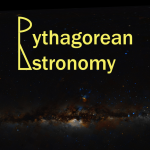Podcaster: Chris North and Edward Gomez
 Title: Pythagorean Astronomy: Exoplanets and EWASS roundup
Title: Pythagorean Astronomy: Exoplanets and EWASS roundup
Organization: Cardiff University and Las Cumbres Observatory
Link: http://pythagastro.uk Twitter: @cardiffphysx, @chrisenorth,@zemogle
Description: April saw Liverpool host the European Week of Astronomy and Space Science, from which there were a many new developments and discoveries, a few of which Chris North and Edward Gomez discuss this month. The conference came just days after the NASA and ESA made the announcement that the largest astronomy project in recent times, the James Webb Space Telescope, will be delayed. Its launch has been pushed back from the (already-delayed) 2019 to 2020.
In other news from the EWASS conference, we discussed:
- the ages of stars in the centre of the Milky Way
- hotspots on neutron stars,
- using astronomy techniques in ecology
- flares from stars, and the implications for habitability
In more cheery recent news, NASA’s TESS satellite was successfully launched, with an aim of discovering thousands of new exoplanets. Meanwhile, ESA selected ARIEL to be launched in just over a decade. With a goal of characterising the atmospheres of exoplanets, Ariel will revolutionise our understanding of these alien worlds. To find our more about TESS, ARIEL and other current and future exoplanet missions, Chris spoke to Dr Subi Sarkar, based here in Cardiff University. Subi discussed how TESS will be different from Kepler, and what we’ll find out from CHEOPS and ARIEL.
An extended edition of an original broadcast on 25th April 2018 as part of Pythagoras’ Trousers on Radio Cardiff.
Subscribe to the podcast, or visit pythagastro.uk for an archive.
Bio: Dr Chris North is an astronomy researcher and science communicator based at Cardiff University. As well as being the Ogden Science Lecturer in the School of Physics and Astronomy, he holds an STFC Public Engagement Fellowship entitled “The Dawn of Gravitational Wave Astronomy”. While his background is cosmology and infrared astronomy, he currently focus more on gravitational waves. His emphasis on communication is workshops for schools, as well as online interactive resources. He is also a co-author of several books.
Dr Edward Gomez has been fascinated by astronomy since childhood. When he realised that he could use maths and computers to do fun things with astronomy, he knew he was hooked for life. He never grew out of it and now he is lucky enough to be a professional astrophysicist. As part of his role with LCO he tries to find novel ways to engage the public in astronomy. This has taken the form of creating citizen science projects like Agent Exoplanet, interactive educational web apps like Star in a Box, and online community events like Show Me Stars.
Today’s sponsor: This episode of “365 Days of Astronomy” is sponsored by — no one. We still need sponsors for many days in 2017, so please consider sponsoring a day or two. Just click on the “Donate” button on the lower left side of this webpage, or contact us at signup@365daysofastronomy.org.
Or please visit our Patreon page: https://www.patreon.com/365DaysOfAstronomy
End of podcast:
365 Days of Astronomy
=====================
The 365 Days of Astronomy Podcast is produced by Astronomical Society of the Pacific. Audio post-production by Richard Drumm. Bandwidth donated by libsyn.com and wizzard media. You may reproduce and distribute this audio for non-commercial purposes. Please consider supporting the podcast with a few dollars (or Euros!). Visit us on the web at 365DaysOfAstronomy.org or email us at info@365DaysOfAstronomy.org. This year we will celebrates the Year of Everyday Astronomers as we embrace Amateur Astronomer contributions and the importance of citizen science. Join us and share your story. Until tomorrow! Goodbye!

